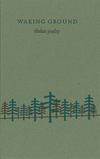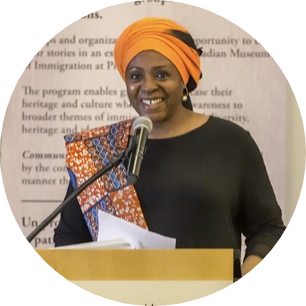Nova Scotia and New Brunswick Poetry Awards Celebrate Poetic Voice and Environment
Poets in Nova Scotia and New Brunswick illuminate our everyday realities
Poets in Nova Scotia and New Brunswick illuminate our everyday realities and environment in collections shortlisted for the JM Abraham Poetry Award and the New Brunswick Poetry Award.
Poetry, Photography, and Black Visibility

Black Matters by poet Afua Cooper and photographer Wilfried Raussert and has been shortlisted for the 2021 JM Abraham Poetry Award. Black Matters explores Black history, resilience, everyday experiences and joy across different cities.
Raussert is the Chair of North American and Inter-American Studies at Bielefeld University, Germany, and works across music, literature, photography, art and literary criticism.
It started as street art and walking the cities, Raussert says, but he was inspired to connect the street art with people living and walking the streets, and he shared the photographs with Cooper in 2017.
“I live in a city, he lives in a city, we are citified people,” Cooper says. “The themes that we engage, the themes of the African Diaspora, is an enduring theme for me throughout my life, in my work, and in my writing, and a lot of the experiences of African Diaspora people is centered in urban spaces.”
Cooper is a multidisciplinary scholar and artist, and she has studied literary arts, history, humanities, education and human and civil rights. From 2018 to 2020 she served as the Poet Laureate of Halifax Regional Municipality.
“I draw from all those experiences, right, so the external space but also your internal space; imagination counts for a lot in poetry creation,” Cooper says.
She always wanted to write about John Ware, Cooper says, but couldn’t get the poem out until she saw Raussert’s photograph, “Father and Son.”
“Invitation to Dance” inspired her poem “Jupiter Wise,” about Jupiter, who was enslaved in Prince Edward Island and wore a white mask for survival.
The photograph also represents Latin-African culture, a growing field that has been neglected before. Raussert says, “This is also a new connection of Black culture, and Latin culture, and bringing this all into one image.”
Black Matters also explores everyday experiences, love and joy throughout the collection, in poems “Lami and Nina,” “Live With You in a House by the River,” and others.
“Uncles” and “A World Greener than Eden” were inspired by the pandemic and the first lockdown in March, Cooper says, when there were long lines at the supermarkets.
“It got me thinking about how we get our food, who grows our food; it got me thinking about farmworkers, migrant workers who are not looked after properly, but they grow our food, and how grateful we are at this moment in the pandemic that we still have food,” Cooper says.
Poetry also inspired photography; Raussert took “The Suitcase” and “Urban Fields” in reflection of Cooper’s poems.
“I think poetry is a very powerful artistic expression, and also having a little bit of this kind of intensity, immediacy, a bit of photography, in this way, I think they go well together,” Raussert says.
Engaging with beauty, the environment, and people through poetry

shalan joudry is a mother, oral storyteller, poet and ecologist from Kespukwitk (southwest Nova Scotia), who lives in L’sitkuk (Bear River) First Nation. Her most recent collection, Waking Ground, is shortlisted for the 2021 JM Abraham Poetry Award.
“Poetry is a way for me to reflect on life, and to engage deeper,” joudry says.
Waking Ground examines social and ecological challenges faced from the legacy of Canada’s settlement, the resilience of Mi’kmaw culture and collective work of healing.
“I am a firm believer that our relationship, our human relationship to nature needs to be reconnected and strengthened, no matter your culture, nationhood or where you live in the world. I think it’s a human thing that we need to reconnect to nature,” joudry says.
She has been learning and increasing her use of Mi’kmaw language. Two of the poems in Waking Ground were written in Mi’kmaw first and then translated.
Three of the poems, under a set called “sipu’l” are about rivers that were named in Mi’kmaw originally and later given English names. In Mi’kmaw, joudry says, rivers are named by their character or attributes.
“These poems are also a reclaiming of language for me, so this book is a reclaiming of history, perspective, story and voice,” joudry says.
Waking Ground also acknowledges the hard work of people contributing to ecological, cultural, racial and social causes.
“For example the poem, ‘ceremony for the end of day’ acknowledges how tired one must feel each evening. In the poem i’m saying to them, ‘i hope you take the time to rest,'” joudry says.
The poem “depths” examines the work of Indigenous people even through the emotional toll of remembering. joudry says, “i’m not afraid of talking about some painful things, but also there’s so much power and resilience that I also get to celebrate.
“There’s work to do, but we can do it, and it’s going to be beautiful.”
Humans, Nature, and Technology

Emily Skov-Nielsen’s debut book The Knowing Animals explores the connection between human consciousness, nature, animals and women’s experiences, and has been shortlisted for the 2021 New Brunswick Poetry Award.
“What I became obsessed with, largely during my MA in English/Creative Writing degree, was the idea that human culture and technology could be seen and experienced as part of ecology, which works against the notion that nature is wholly ‘other,’” Skov-Nielsen says.
A large inspiration for The Knowing Animals was personal experiences of growth as a woman, Skov-Nielsen says, “through girlhood into early motherhood – the pregnancy and birth of my daughter were very inspiring biological/emotional processes for me.”
She explores female sexuality, growth and motherhood throughout the book. As a feminist, she says she is aware of the marginalization women experience in the past and today.
“I felt like the most political act I could do in my writing was to write very candidly about my experiences as a woman, and to reveal and reflect on the complexity and nuance and difficulty and power that I have encountered through, and have grown on account of, these experiences,” Skov-Nielsen says.
The poem “Volta” uses playful rhythms and rhymes present throughout the book, Skov-Nielsen says, and reflects themes at the heart of The Knowing Animals.
“I’m profoundly interested in the magic and power of language, of storytelling, paradoxes and metaphors, and how these things allow us to reimagine reality – our experience of it, our place within it, our relationship to it,” Skov-Nielsen says, “which has this marvelous effect of both deepening and expanding our connection to the world around us, and to other lives, both human and nonhuman.”
Writing Where We Are

Keeping Count is M Travis Lane’s 18th collection of poetry and has been shortlisted for the 2021 New Brunswick Poetry Award. It explores the natural world and themes of mortality and aging.
“Anything might start a poem,” Lane says. “I am not sure what ‘inspiration’ is – but it is not the ‘subject,’ my current circumstances affect my thinking and my writing.”
Her family has always loved poetry, Lane says, and they recited poems and songs to one another growing up. “I have enjoyed poetry all my life.” Nature is also important to her family, Lane says, and she thinks about it a lot.
“An awareness of various social problems turns up in much of my poetry – especially war, poverty, illness – and ecology has always been a central concern.”
She completed a BA (Junior PBK) at Vassar College, known for their contribution to ecology studies in the US. Lane was born in 1934, only five years before the Second World War started in 1939.
“I was old enough to understand what was happening during World War II, and subsequent wars. I was taught early about racial injustices,” Lane says. “And age has its own lessons. Trees and forests die, family and friends die, social conditions change, and the body and mind deteriorate. We write where and how we live.”
Written By:




